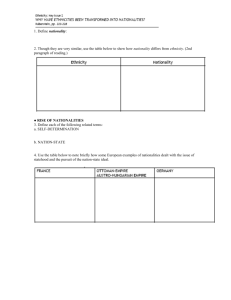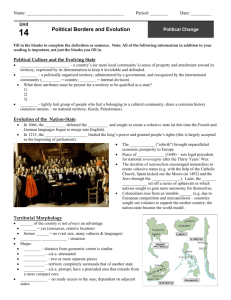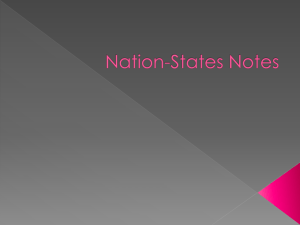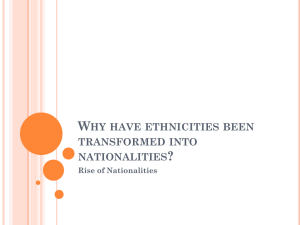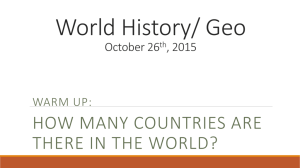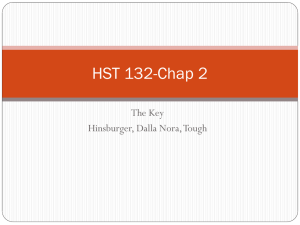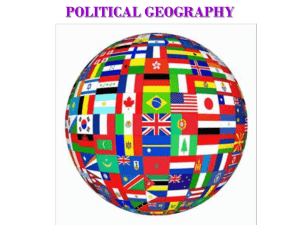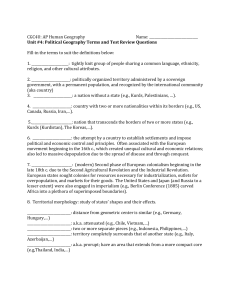Political Geography
advertisement
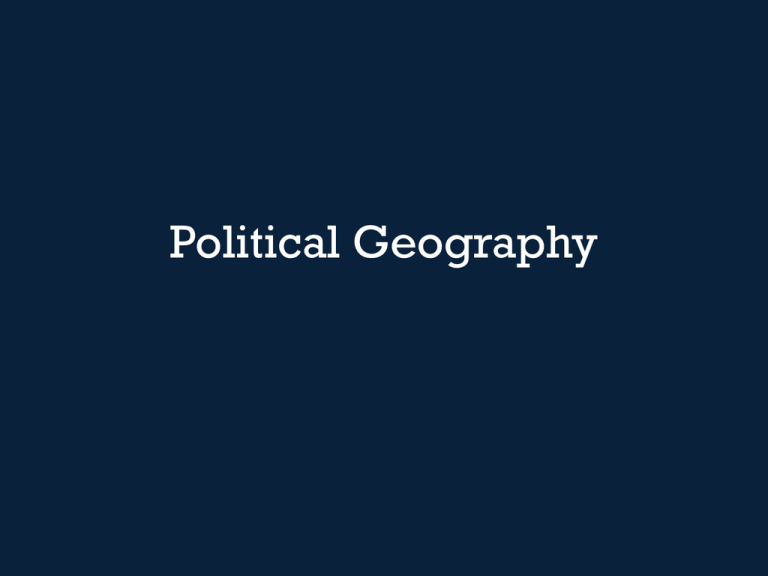
Political Geography To review from yesterday… Ethnicities and Nationalities • State: An independent, bounded, and internationally recognized territory with full sovereignty over the land and people within it • Nation: Cultural unit- group that shares ancestry, regardless of whether the group owns its own country – A group becomes a nation when they start to see themselves as separate and different from foreigners Ethnicities and Nationalities • Nationality: Identity with a group of people who share legal attachment and personal allegiance to a particular country • Nation-state: A state whose territory corresponds to that occupied by a particular ethnicity that has been transformed into a nationality – Denmark, Japan, Sweden, Portugal, Costa Rica – Most countries are NOT nation-states • Nationalism: Loyalty and devotion to a nationality – It is a centripetal force! Ethnicities and Nationalities • Multiethnic State: A state that contains more than one ethnicity – United States- multiple ethnicities that claim the U.S. as their nation – their nationality is American • Multinational States: A state that has two ethnic groups with traditional self-determination that agree to coexist peacefully – – – – – Former Soviet Union (doesn’t exist. Former.) Russia UK Canada South Africa • Stateless nation: A nation without a state Ethnicities and Nationalities • Ethnonationalism- feeling of belonging to a minority nation that is in a state dominated by a more powerful nation – Can lead to separatism – Irredentism- when a nation’s homeland spills into another state, so then the people on the “wrong side” want to join the other state • Multi-state nation Disagreements over Sovereignty • Korea – Divided after WWII – The UN recognizes them as separate • China and Taiwan – Taiwan run by nationalists – Taiwan says they’re sovereign, China disagrees • The U.S. only agreed with Taiwan until 1971 • Western Sahara – Morocco claims it – Most African nations recognize its sovereignty • Polar regions – Different states “control” different portions Three basic types of government • Unitary – Central government has most of the power – France, Saudi Arabia, Japan • Federal – Regional governments share power with the central government – Often has a constitution – United States of America, Mexico, Canada, India Colonialism and Imperialism • City-state: a sovereign state that comprises a town and the surrounding countryside • Colony: A territory that is legally tied to a sovereign state rather than being completely independent • Colonialism: The effort of one country to establish colonies and to impose their political, economic and cultural principles on that territory • Imperialism: Control of a territory already occupied and organized by an indigenous society State Shapes • • • • • Compact Elongated Prorupted Perforated Fragmented • Landlocked States Boundaries • • • • • • • • • • • • • • • • • • • Boundary: vertical plane between states that cuts through the rocks below, and the airspace above (even outer space). Evolution (of boundaries): -Definition: legal document or treaty drawn up to specify actual points in the landscape -Delimitation: cartographers put the boundary on the map -Demarcation: boundary is actually marked on the ground w/ wall, fence, posts,… (too expensive or impractical for most borders to be demarcated) Types (of boundaries): -Geometric: straight-line, unrelated to physical or cultural landscape, lat & long (US/Canada) -Physical-political: (natural-political) – conform to physiologic features (Rio Grande: US/Mexico; Pyrenees: Spain/France) -Cultural-political: mark breaks in the human landscape (Armenia/Azerbaijan) Genesis: origin-based classification of boundaries -Antecedent: existed before the cultural landscape emerged (e.g., Malaysia/Indonesia) -Subsequent: developed contemporaneously with the evolution of the cultural landscape (e.g., US/Mexico) -Superimposed: placed by powerful outsiders on a developed landscape, usually ignores preexisting cultural-spatial patterns (e.g., Indonesia/Papua New Guinea; Haiti/Dominican Republic) -Relict: has ceased to function, but its imprint can still be detected on the cultural landscape (e.g., North/South Vietnam, East/West Berlin) Disputes (over boundaries): -Definitional: focus on legal language (e.g. median line of a river: water levels may vary) -Locational: definition is not in dispute, the interpretation is; allows mapmakers to delimit boundaries in various ways -Operational: neighbors differ over the way the boundary should function (migration, smuggling) (e.g., US/Mexico) -Allocational: disputes over rights to natural resources (gas, oil, water) (e.g., Saddam Hussein invaded Kuwait, in part, due to a dispute over oil rights regarding the Ramallah oil field (mostly in Iraq but straddling into Kuwait) Centripetal and Centrifugal • Bind states, unify them and help them succeed • Nationalism – Iconography is using symbols • Unifying institutions – Schools – Military – religion • Destabilizing, challenging, creates discord • Organized religion • Nationalism in a state with many nationalities – Subnationalism • Devolution • Ethnic cleansing Supranationalism • An association of three or more states created for the mutual benefit and to achieve shared objectives – loss of national independence – someone has your back! – easier to achieve goals • • • • • • • UN EU NATO NAFTA Arab League OPEC British Commonwealth Some words… • Enclave- a district surrounded by a country but not ruled by it – Lesotho • Exclave- part of a national territory separated from the main body of the country – Alaska • Ethnic Enclave: examples include Chinatown, Little Italy Devolution • Regions in the state demand more autonomy and receive it • By doing this, the central government loses authority • Basque and Catalonia in Spain • Chechnya in Russia Balkanization • The break up of a large country into smaller, independent regions or countries • First used when Yugoslavia broke into six countries during the late 80s- early 90s Electoral Geography • Redrawing legislative boundaries with the purpose of benefitting the party in power – Wasted vote- spreads out the opposition – Excess vote- concentrates opposition into a few districts – Stacked vote- Links distant areas of likeminded voters into oddly shaped boundaries • Often used to elect ethnic minorities
